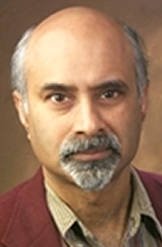A Bold Visionary of the Interfaith Movement
A Tribute to Bill Lesher
by Joseph Prabhu
Bill Lesher – Photo: Jean Lesher
The Reverend William E. Lesher – Bill to his friends – was a man of many parts and roles. Seminary president, theological scholar and educator, pastor and religious leader, civil rights advocate and marcher, pioneer of the modern interfaith movement, and toward the end of his life, a tireless promoter of a possible new civilization for humankind. These were some of the roles he assumed and filled with distinction in his life of 85 years. A person of boundless energy and compassion, cheerful disposition, and strong character, he was many things to many people. Undoubtedly there will be numerous tributes to him from the many whose lives he touched and impacted. This tribute is from a philosopher and theologian, and a fellow-participant in the interfaith movement.
We first met in Barcelona where he invited me in his role as Chair of the Board of Trustees of the Parliament of the World’s Religions into a series of conversations, in part because I was a friend and colleague of the late Raimon Panikkar, who delivered the opening address to the Parliament in July 2004. What most struck me, besides his personal charm and warmth, was the boldness of his vision for the interfaith movement in general and the Parliament in particular.
That boldness is best expressed in his own words, spoken in an interview with Kosmos Journal in March 2009, when he said: “I think of the inter-religious movement as the spiritual expression of the globalized world. The very existence of the inter-religious movement is a massive change in the religious landscape of the world brought about by the technological advances that have created this age of globalization … the inter-religious movement is providing occasions for believers of various religious traditions to engage one another, to respect and better understand each other. Out of these encounters friendships are being formed and common action is being undertaken to address local and global needs. The movement is an essential force for good that is helping humanity meet the challenges of the modern world.”
The 2004 Barcelona Parliament was held in the wake of terrorism worldwide, some of it carried out in the name of religion. The gathering focused on the many dimensions of so-called “religious violence” and came up with policies and prescriptions for a more just, peaceful, and sustainable world. Bill was quite clear that personal and societal transformation were deeply intertwined, just as he was insistent that, important as the goals of religious understanding and harmony were, their full actualization required action in the world that made a tangible difference. To that end, he asserted the necessity of engaging the leading institutions of society in politics, economic life, culture, and education. Having been a seminary president for 25 years and also involved in civil rights campaigns, including the march from Selma to Montgomery in 1965 with Martin Luther King, Jr., he embodied for me as for many others the ideal of a socially engaged intellectual and religious leader.
At his urging, I joined the Board of Trustees of the Parliament. It was also at his urging that I took on the role of program chair of the Melbourne Parliament in 2009. Despite my reluctance to assume this position, because of the enormous amount of work involved and because I was still involved in full-time academic teaching and research, I agreed to take it on in deference to Bill and his remarkable powers of persuasion.
Shaping the Melbourne Parliament
Bill speaking about the history of the Parliament and the upcoming Parliament in Melbourne at the Campfire Film Foundation
The Melbourne Parliament, where Bill made several important speeches outlining his vision, built on the groundwork laid in previous Parliaments in working towards greater religious harmony, peace, and justice. But there were also at least three areas of innovation out of which new directions and paths were forged. First, Towards a Global Ethic – An Initial Declaration, one of the key documents of the 1993 Parliament in Chicago, was expanded to include the worlds of commerce and business, recognizing both for the vital roles they play in modern social life. It was also a recognition of how economic inequalities between Northern and Southern countries have contributed to the poverty wracking many parts of the globe.
Second, a conscious and concerted effort was made to address the needs of indigenous peoples around the world. Melbourne was in part chosen as the site of the 2009 Parliament at the invitation of the Australian Prime Minister at the time, Kevin Rudd, who felt the Parliament could be instrumental in better integrating the indigenous peoples of Australia into mainstream society there. Lastly, the 2009 Parliament was the first to have the environment and ecological issues as a central concern. Melbourne took place shortly before the United Nations Climate Change Conference in Copenhagen, and the Parliament was able to send a delegation there to report on the environmental discussions that took place at the Parliament.
Bill and Jean on their 60th wedding anniversary with Joseph Prabhu and Ruth Broyde Sharone – Photo: SCCPWR
Bill served as the chair of the Board of Trustees of the Parliament from 2003-2010, a period during which his energy and passion, leadership and vision helped immeasurably to consolidate the reputation of the Parliament as a premier global interfaith organization working for good in the world. Shortly after he retired from the Board, Bill and his wife Jean moved to Pilgrim Place in Claremont, California, a vibrant retirement community – which was an irony because Bill was far from retired. In addition to serving with Jean as an engaged advisor to the Southern California Parliament of the World’s Religions (SCCPWR) and a participant in many of its activities, he was actively involved in the Inland Valley Interfaith Network and the Compassionate Cities programs in Claremont and Pomona, based on Karen Armstrong’s “Charter of Compassion.”
The main focus of Bill’s energies in the last five years of his life was the vision of an “ecological civilization.” This project was pioneered by John Cobb with the assistance of a vast network of ecological activists, including Bill McKibben. As the term “ecological civilization” suggests, we are talking about the advent of a new civilization founded on principles of interdependence and solidarity between the human, natural, cosmic, and divine worlds; a civilization grounded on a new way of viewing life and pointing to a radically new understanding of our human and cosmic purpose.
Up until his very last days, Bill dedicated himself to helping bring about this civilization. For close to two years he co-chaired with Chris Ives and myself an interreligious track in the conference entitled “Toward an Ecological Civilization,” held in Claremont in June 2015. There Bill spoke passionately about the new humanity he envisaged emerging out of this civilization. It was almost as if he saw the new heaven and new earth mentioned in the Book of Revelation.
Spiritual Journeys
I have detailed a small though significant part of Bill’s multifarious public activities. But I was also privileged to know him as a friend and fellow spiritual-seeker. Not surprisingly, his public activism both reflected and was fed by a vibrant spiritual life. In a brief article like this one, it is a challenge to convey the richness and depth of his inner life and I am compelled to be selective. I will focus, therefore, on just three aspects of Bill’s spiritual journey.
Photo: Wikimedia
First, he took interfaith dialogue seriously as a requirement of interreligious understanding and also as a source of personal spiritual enrichment. This enrichment usually takes the form of learning and appreciating religious traditions other than one’s own. Thus, a Christian might learn about Hindu or Buddhist meditative practice and discern parallels with the contemplative practices of her own tradition. There is, however, a stage beyond this when inter-faith dialogue leads to rigorous intra-faith dialogue. Here, the differences with other traditions, and specifically differing truth-claims, challenge one’s original convictions. I would not claim that Bill engaged in serious intra-religious dialogue, but there is no doubt that his interfaith encounters, particularly with the Vedantic and Buddhist traditions, both relativized and deepened his Christian faith.
One way in which it did that was through his study and practice of meditation. While in Claremont, Bill and Jean were faithful members of All Saints Episcopal Church in Pasadena. There Bill was introduced to the rigorous practice of meditation through the influence of the Rector of All Saints at the time, Ed Bacon, and the meditation workshops of UCLA psychiatrist and meditation teacher Dan Siegel. It was a revelation to him! It opened up worlds of inner and psychic experience which Bill, given his longstanding enthusiasm for science, was able to connect with developments in modern science, particularly the neurology of the brain, and contemporary cosmology. His exploration in meditation resonated deeply with what he was reading about dark matter and dark energy, notions that fascinated him.
Some flavor of the congruence he felt between inner and outer worlds comes through in the first verse of a remarkable poem he wrote called “Transformation”:
I have discovered that my soul is the dark matter of my body
the invisible tissue that permeates all my parts.
So when, with Mother Mary, “my soul magnifies the lord,”
it is my whole body, every aging organ, every cancer-filled bone,
every muscle and molecule reaching out and up in joy and thanksgiving.
This joy and thanksgiving suffused his last days and his affirmative manner of dying. He stopped his medications and refused pain-killers he felt might impair his full consciousness. Bill was determined to be as awake and as open as possible to the new psychic experiences the process of dying was revealing to him. The conversations that I and a few others had with him were wonderful revelations of what the Tibetan Book of the Dead describes as the “bardo” state, that liminal state between biological life and physical death. Those experiences, despite the pain he was undergoing, filled him with joy and anticipation for what was to come next.
When he mentioned casually to a friend who visited him in hospice care that his nights were sometimes long and lonely, word spread rapidly around Pilgrim Place, and a whole team of volunteers formed to keep vigil by his side day and night. The last words he probably heard were from Psalm 39, a portion of which says: “I am a passing guest, as were all my forefathers.” He was indeed that, but a passing guest who blessed this world abundantly in his passage through it and is now undoubtedly exploring the world to which he has gone.
Header Photo: barnyz, C.c 2.0 nc nd





